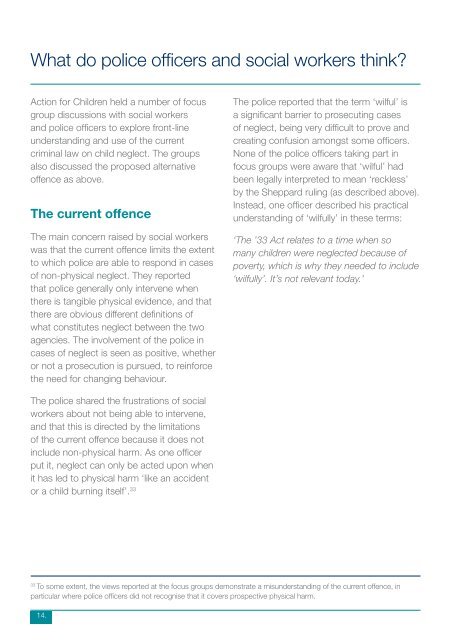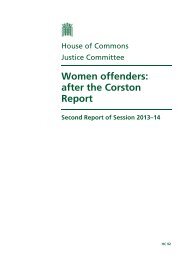The criminal law and child neglect: - Action for Children
The criminal law and child neglect: - Action for Children
The criminal law and child neglect: - Action for Children
- No tags were found...
You also want an ePaper? Increase the reach of your titles
YUMPU automatically turns print PDFs into web optimized ePapers that Google loves.
What do police officers <strong>and</strong> social workers think?<strong>Action</strong> <strong>for</strong> <strong>Children</strong> held a number of focusgroup discussions with social workers<strong>and</strong> police officers to explore front-lineunderst<strong>and</strong>ing <strong>and</strong> use of the current<strong>criminal</strong> <strong>law</strong> on <strong>child</strong> <strong>neglect</strong>. <strong>The</strong> groupsalso discussed the proposed alternativeoffence as above.<strong>The</strong> current offence<strong>The</strong> main concern raised by social workerswas that the current offence limits the extentto which police are able to respond in casesof non-physical <strong>neglect</strong>. <strong>The</strong>y reportedthat police generally only intervene whenthere is tangible physical evidence, <strong>and</strong> thatthere are obvious different definitions ofwhat constitutes <strong>neglect</strong> between the twoagencies. <strong>The</strong> involvement of the police incases of <strong>neglect</strong> is seen as positive, whetheror not a prosecution is pursued, to rein<strong>for</strong>cethe need <strong>for</strong> changing behaviour.<strong>The</strong> police reported that the term ‘wilful’ isa significant barrier to prosecuting casesof <strong>neglect</strong>, being very difficult to prove <strong>and</strong>creating confusion amongst some officers.None of the police officers taking part infocus groups were aware that ‘wilful’ hadbeen legally interpreted to mean ‘reckless’by the Sheppard ruling (as described above).Instead, one officer described his practicalunderst<strong>and</strong>ing of ‘wilfully’ in these terms:‘<strong>The</strong> ’33 Act relates to a time when somany <strong>child</strong>ren were <strong>neglect</strong>ed because ofpoverty, which is why they needed to include‘wilfully’. It’s not relevant today.’<strong>The</strong> police shared the frustrations of socialworkers about not being able to intervene,<strong>and</strong> that this is directed by the limitationsof the current offence because it does notinclude non-physical harm. As one officerput it, <strong>neglect</strong> can only be acted upon whenit has led to physical harm ‘like an accidentor a <strong>child</strong> burning itself’. 3333To some extent, the views reported at the focus groups demonstrate a misunderst<strong>and</strong>ing of the current offence, inparticular where police officers did not recognise that it covers prospective physical harm.14.
















